The COVID Crisis - Tsunami for the Poor in India
The COVID Crisis - Tsunami for the Poor in India
Mangalore Today News Network
By S. G. Vombatkere
Mangaluru, June 10, 2020: Coronavirus SARS-CoV-2 which causes Covid-19 is just one of the more recent viruses in our environment, and it is here to stay. It will add one more virus to the billions of viruses to which human bodies are already host.
The problem faced by humanity is not so much about Covid-19 per se, or about virus-caused disease or death, but more about their aggravating already damaged societal and economic situations nationally and internationally. The pre-lockdown situations of economic and physical violence, hunger and deprivation are due to development agendas based upon economic policy of perpetual economic growth. This economic development policy has been adopted and accepted globally, regardless of the political system, and dictates that perpetual economic (GDP) growth must be ensured at any human, environmental or ecological cost.
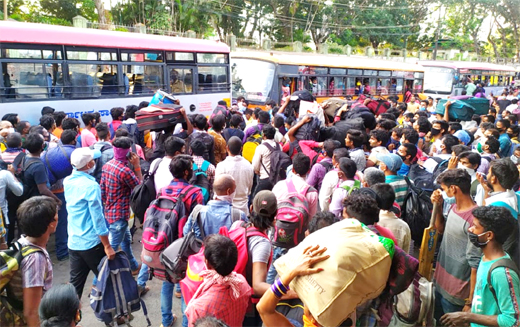
Media focus
National and international mainstream media is almost exclusively focused on Covid-19. They discuss and debate governments’ attempts to balance the dangers and risks of Covid spread on societies, against the unprecedented social and economic crises caused by social-distancing lockdowns to prevent Covid spread.
Media is also reporting the lockdown-initiated harsh reality of the misery, suffering and condemnable multiple injustices heaped upon humungous numbers of daily-wage workers, especially migrants and others in the unorganized sector because of job-loss, not being paid by employers, no food and no shelter, and no means to return to their home states. This is apart from the urban and rural poor who are equally impacted. The ground reality can no longer be concealed behind political hype.
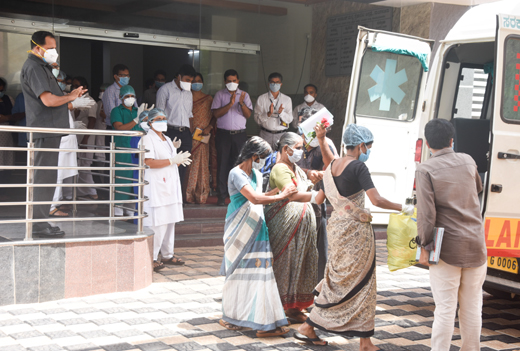
India is in an unprecedented economic crisis concerning the manufacturing, farming, services, health, banking, finance and almost every other sector. Governments are planning and implementing measures to restore the economy, but these are directed at reverting to the prelockdown model, already characterized by crippling socio-economic inequality, violence, conflicts and tensions in society, miserably poor public health due to malnutrition, and rapidly deteriorating environments.
Governments are unmindful or uncomprehending that reverting to the pre-lockdown development model will drive societies towards becoming profoundly unhealthy, and perhaps towards implosion and collapse.
Pre-Covid invisibility to post-Covid destitution
Of India’s labour force in the agricultural and industrial sectors, over 80% are in the unorganized sector. They do hard, unremitting and often demeaning physical work with their hands. Labour laws, meant to prevent exploitation of labour, do not apply to them. They are exploited in every which way by their employers.
Rural people, whose work or occupation is based upon agricultural seasons, practices and requirements, migrate seasonally to towns and cities for work when they are not required in agriculture. Over decades, millions have migrated to urban areas distant from their homes, and found petty employment, living in slums often cheek-by-jowl with multi-storeyed apartments. They are the invisible poor and infra-poor – construction workers, domestic workers, waste pickers, and the homeless, who have “established” themselves in urban life, subject to the tender mercies of the police and/or the mafia. Only a minuscule fortunate among them have secured white collar jobs in offices or blue collar jobs in MSME.
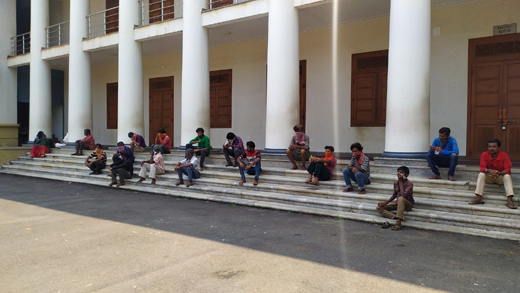
These out-of-state migrants are often targeted by migrants from within the same state because of scarce jobs or civic resources, and political parties have even come to power on the basis of “belonging”, creating “the other”. Thus, social tension is a part of every migrant’s daily life, compounding the miseries of slum existence and exploitative employers.
The 80% unorganized workers are the backbone of urban society, which is unhealthy by any standards. Due to the 4-hours-notice national lockdown, almost all these invisible poor have lost their jobs, salary dues to them have not been paid, and their employers have vanished. They are stranded in places far from their home, without work, money, food and shelter. Their already “burey-din” have turned to destitution. But as the lockdown has also affected the middle class and industrial and commercial interests, the pain and suffering of the invisible backbone of urban society has suddenly become visible to them!
About 20% of the work force have the tenuous protection of labour laws, which govern work hours, remuneration, safety and other facilities at workplace, and right of collective bargaining with employers. However, in almost all labour disputes, governments are firmly if covertly on the side of the employer, who even gets police protection. This 20% is also mostly migrant like the 80% unorganized.
Nakedness exposed
Covid is beginning to be more of a political issue than a public health issue. The political class faces the dilemma of balancing further damage to the staggering pre-lockdown economy by continuing lockdown, against handling the political fallout of Covid re-emergence by lifting lockdown to revive the economy. Focus is on the economy.
On the other hand, if people are considered relevant, some realities become apparent. The hundreds of millions of people who are walking home to escape from the daily hell of urban living and working conditions, don’t give a damn for the economy, because they now have understood at least seven naked truths:
(1) The economy always took from them much more than it ever gave them.
(2) The economy needs them much more than they need the economy.
(3) They have been given far worse than a raw deal by the lockdown.
(4) The lockdown was imposed to protect the upper economic sections of society who imported the Coronavirus.
(5) Social-distancing, washing hands with soap and water, or using hand-sanitizer is farcical, a cruel joke for them.
(6) Suffering and death due to hunger or exhaustion is more real than due to Covid, and
(7) They have nothing to lose by going back home because, cruelly spurned by their employers, they have nothing anyway.
When lockdown was imposed, migrant workers lost no time to understand these seven truths, and their exodus exploded into national and international media. It took governments by surprise because of lack of foresight and thinking-through their executive decisions. Figuratively, their political jaws sagged open in amazement. As the negative political impact of the money-foodshelter humanitarian crisis images sunk in, the scramble in the central and state ministries of home, health, finance and food & public distribution began.
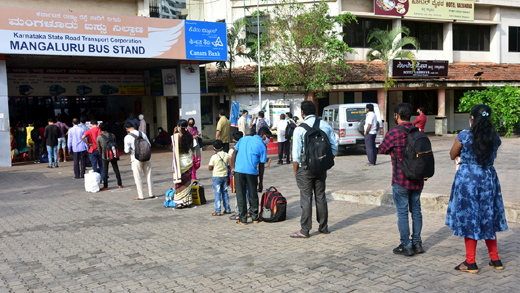
The already-hurt agriculture sector was badly wounded by the lockdown, but that did not attract governments’ attention like the urban situation did. A neatly-named (non-public) fund was hurriedly instituted, and governments turned to tracking Covid and scrambling to provide hospital beds and PPE for doctors, nurses and health workers. But the millions on foot across the country did not attract much of governments’ attention, although its scale was of epic proportions. Volunteers from civil society groups and concerned individuals in their hundreds across the country stepped in, taking personal risk to supply essential food, etc. to workers who were trekking back hundreds of kilometres to their homes. They spent money from their own pockets, and appealed to friends and groups to help with cash and kind, working continuously for days on end, stretching the limits of their endurance. Yet, obviously nowhere nearly all trekking people could be catered to – governments’ inertia prevailed for days.
Despite partial paralysis of decision-making, and against all odds, doctors, nurses and especially the public health workers nobly rose to the occasion at considerable personal risk and sacrifice. Much political communal finger-pointing and blame-gaming happened, as usual trying to fix who did wrong rather than what went wrong. Some political optics of banging utensils, lighting candles and showering petals happened. Indecision in policy and executive directions at top levels of central and state governments – with the possible exception of Kerala – resulted in condemnable but characteristic police excesses on escaping migrant workers. Notwithstanding, most district administrations handled both Covid and migrant workers situations with quiet aplomb. It might even be said that the administrations managed in spite of politicians.
Today, the unmitigated, continuing suffering of many millions of urban and rural poor remains standing at the door of the political class, which remains focused on reviving the economy rather than on people’s problems. The preferential focus of the political class stands as nakedly exposed as the suffering of the vast majority.
Economic revival, no social revival
A survey of a small sample of migrant workers indicated that 95% of respondents wanted to return home, 75% wanted to return even if they were offered work, and 63% were owed wages from before the lockdown.
Hitherto indecisive on the so-called migrant workers issue, governments have refused to allow migrant workers to return home (as in Tamil Nadu), and are amending already pro-employer labour laws to make them blatantly anti-worker (e.g., 12-hour workday, employers not bound to provide basic working conditions such as ventilation, toilets, protective equipment, etc). Further, governments are relaxing environmental laws/rules and offering incentives to improve ‘ease of doing business’, to minimize the “tough situation” faced by local industrialists, and offering all possible facilities and concessions to entice industries abandoning China (as in Rajasthan).
Influenced by business lobbies, Karnataka announced that it would not facilitate the travel of migrant workers back home as their labour was needed to re-start the economy, although it reversed this due to public pressure.
Thus, to revive the economy, workers have been denied the fundamental right to travel at will anywhere within the country, have lost even the little protection that labour laws provided (12-hour days, etc.), and are obliged to work for employers who spurned them. Shall we call them “indentured labour” or coin a more politically acceptable term?
Economic revival through labour enslavement can only lead to more injustice and worsen society already suffering due to inequity and disharmony.
Health is a political issue
The measures to re-start the economy are only making an already unhealthy society even more unhealthy, making the fading “Acche-din” dream even more distant. It does not need proof that holistically viewed, poor health is intimately linked with poverty, with associated hunger, malnutrition, destitution, deprivation, lack of opportunity, etc.
Successive governments have used three yardsticks to “measure” poverty:
(1) On the basis of price of food grain which supply 2,000 to 2,200 calories/person/ day, 37% of our population are poor.
(2) The Arjun Sengupta committee holds that 77% of our population cannot afford Rs.20 per person per day.
(3) The international standard of poverty of $1 per person per day ($1=Rs.55 when this was proposed) makes over 50% of our population poor.
All three yardsticks for poverty do not consider the carbohydrate-protein-fibre-mineral micro nutrient balance essential for nutrition, fuel for cooking, water for necessary intake and hygiene, cost of shelter, clothing, education, health or amusement. Further, about 50% of Indian children under 5-years age are malnourished, under-weight and anaemic. These future adults of India are from the impoverished majority of our population, and benefit nothing but nothing from our economy growing to $5-trillion.
It is clear that poverty is assessed using de-humanized parameters which are convenient for economists to play their statistical games, which are accepted by politicians and bureaucrats. All this, while surplus food grains in FCI warehouses are consumed by rodents and pests, and cost public money merely to maintain inventory, and government is reluctant to release food grains to starving/under-nourished populations.
This mindset of injustice compounded by callousness, understands the price of commodities but not the value of food or of health. It is the mindset of India’s political class which marches to the drumbeat of the corporate band, and its ideology of “monetary-profit-and-economic-growth” above all else.
Insofar as poverty and socio-economic inequality are concerned, over the decades since 1950, the political class is guilty of more or less but continual dereliction of sworn duty to the Constitution of India, and of neglect of its letter and spirit, to the detriment of We the People.
Healthy society
“Health” is about how we live, and the quality of life within the society in which we live. It’s not about the absence of disease in an individual, but about life within the family and, along with family, in the wider community. Viewed holistically, health is a multi-dimensional entity concerning every individual within a healthy society. This is beyond the narrow scope of governments’ health ministries.
The “health sector” worldwide is corporatized, with the possible exception of Cuba. It uses yardsticks of numbers of hospital beds or doctors per thousand population. Japan stands first with over 13 hospital beds against India having only 0.58. Hospitals are focussed on curing or managing disease and treating injury. They are expensive, demand cash up-front before admission, and closely linked with pharmaceutical, bio-engineering and medical insurance businesses. They are out of reach for people of the lower economic sections and in any case have little to do with health, except when viewed through the narrow perspective of absence of disease. They make little contribution to building a healthy society.
The Directive Principles of State Policy in the Constitution of India, require the State to assure people justice, liberty and equality, and promote fraternity among them. This is precisely about creating a healthy society, which values social qualities such as fairness, freedom, security and tolerance, and ranks them above economic concerns, while providing every individual dignified labour with economic and social security.
Plans for a self-reliant India starting with a Rs.20-trillion Atma Nirbhar Bharat Abhiyan package, and standing upon the five pillars of “economy”, “infrastructure”, “system”, “demography” and “demand”, may provide economic impetus, but need to be guided by Constitutional values of justice, liberty, equality and fraternity. However, the 4-L principles of “land”, “labour”, “liquidity” and “law”, would be of little avail, # If government facilitates land acquisition for industry and displaces people who lose livelihood and migrate to cities for work, # If weak labour laws are diluted to be further anti-labour, # If money is given to industry rather than to people who will spend it and raise market demand, and # If environmental and other laws/rules are tweaked to help industrialists who are facing “tough situations”.
Looking forward
The Corona pandemic has resulted in “social distancing” lockdown, causing very serious economic and health consequences on vast numbers of the poor. As the work-force suffers, so does the national economy. Governments are struggling to cope with the consequences, but it is now clear that the attempts are directed at restoring the earlier economic order, which is characterized by inequality, inequity and iniquity.
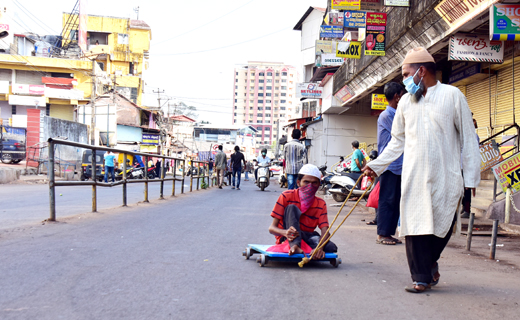
This is not to point at any particular government, but at the present development model of perpetual economic growth year-on-year. Quoting Prem Chandavarkar, “Our development model assumes an economy that must grow whether or not we thrive, whereas we need an economy that makes us thrive whether or not it grows”.
The present model exacerbates economic inequality, heightens social tensions and conflicts, and destroys the environment upon which all life depends. It does not need proof that the result is increasingly unhealthy human societies within which life-style diseases are by far the biggest killers of humans. Public health is a casualty of the development model. Yet, talking-heads only debate Covid-19 infection, death and vaccines, governments struggle to re-establish the same failed development model, migrant workers fall by the wayside from hunger and exhaustion, or are forced by governments to “get back to work or else”, and privileged people wash their hands with soap and water, and wait impatiently for lockdown to be lifted and to visit their favourite malls. As India pursues its aim to raise GDP to $5-trillion by 2024, it can only make society more unhealthy than it already is. When philosopher J.Krishnamurti said, “It is no measure of health to be well adjusted to a profoundly sick society”, he spoke of the society of decades ago. Society has only sickened more since then.
We need a development model to create a healthy society which “… is much more than a community in which the causes of disease are minimised. It is one where, at the very least, human creativity is free to flourish, individuals have the liberty to be who they wish to be … and the spirit of all life and not merely human life, prospers”. [Source -The Lancet]
The Corona crisis demands an “alternate” development model for a healthy society. Although this is already enshrined in the core principles of the Constitution of India, our leaders have little awareness or comprehension of it amidst their myopic and thoughtless quest for power or pelf. It is the duty of We the People to bring our leaders back to understanding our Constitution. Only then will the tsunami which has struck India’s poor abate, and We the People build a healthy society.
Maj Gen S.G.Vombatkere, VSM, focuses on development and strategic issues, using cross-discipline study and systems thinking.
- Need For ‘Students, Alcohol and Drugs’ survey
- New Synthetic Drugs Trapping Youth
- Mood Modifying Chips - Future of Drug Use
- Ramping up Indo-Bangla border security
- IITM- A premier educational Institution in a forest. What can we learn?
- Former PM, Manmohan Singh: Notable laws passed under his tenure
- Hashish on Ratnagiri Seashore
- The Poor cry out to Us: Do we respond?
- Clandestine Meth Labs Sprouting Across India
- Hydro ganja from Bangkok latest craze among youth in India
- "Memories to Treasure" Dr.Michael Lobo’s new book
- Dominance of Private Universities: Will it make education inaccessible to underprivileged students?
- Monti Phest: A rich heritage of South Canara
- Kashmir Bhavan in Bengaluru: A must visit place
- "MAI and I" Book of Angelic Emotions
- Draupadi Murmu - The New ’President of India’
- Anthony Ashram in the city grows a classic museum
- First College of Fisheries in India - A Golden Jubilarian
- Flushing Meadows - A Vintage Mansion
- The Colonel�s Bequest
- A Mangalorean PM and his RBI Governor Brother: The Extraordinary story of the Benegal Brothers
- There is no higher religion than Truth: Theosophical Society
- L�affaire - Ashu & Yiju of Mangalore
- Mangalore in Kowloon
- 1568 to 2018 AD: 450 years of Christianity in Mangaluru
- Vice President elect Naidu moves on from nadir to zenith, the phenomenal journey
- Embracing the Outdoors: How Heated Jackets Are Revolutionizing Cold Weather Activities
- Efficient and Sustainable Packaging Solutions with FIBCs
- The Hybrid Kilt Revolution | Where Tradition Gets Trendy
- Affordable Elegance | Embrace Style on a Budget with Cheap Kilts
- Unleashing Style and Functionality | Exploring Tactical Kilts
- Mangalore’s Heroic Lady marks 105th Birthday
- Santa the Christmas spirit
- Geriatric care: Mangalore strikes a fine balance
- The Don Who Made Two Empires to Clash
- CHITRAPUR SARASWATS - A Great Kanara Community
- Our new President Ram Nath Kovind’s significant journey to Rashtrapathi Bhavan
- Marriages made in heaven, big fat weddings made in India
- Eid insight - The giver of glad tidings
- CITY INFORMATION
- TRAVEL
- TOURIST INFORMATION
- HEALTH CARE
- MISCELLANEOUS




 Write Comment
Write Comment E-Mail To a Friend
E-Mail To a Friend Facebook
Facebook Twitter
Twitter  Print
Print 


